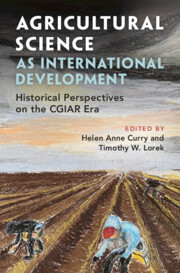
-
- You have access
- Open access
- Cited by 1
-
Cited byCrossref Citations
This Book has been cited by the following publications. This list is generated based on data provided by Crossref.
Curry, Helen Anne and Nehring, Ryan 2024. The history of crop science and the future of food. PLANTS, PEOPLE, PLANET, Vol. 6, Issue. 5, p. 995.
- Publisher:
- Cambridge University Press
- Online publication date:
- November 2024
- Print publication year:
- 2024
- Online ISBN:
- 9781009434713
- Creative Commons:
-
This content is Open Access and distributed under the terms of the Creative Commons Attribution licence CC-BY-NC-ND 4.0 https://creativecommons.org/creativelicenses


